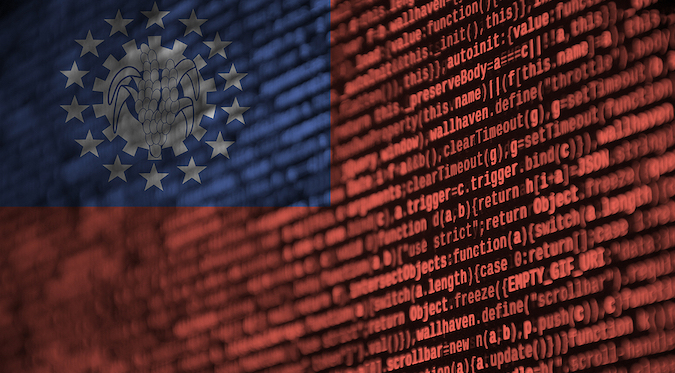
Myanmar’s military has imposed repeated internet blackouts, blocked some social media sites and drafted a cybersecurity bill as it attempts to grind down resistance to its takeover.
These moves by the new junta have deepened worries that internet-hungry Myanmar will no longer have access to real-time information, be largely cut off from the outside world and face draconian punishments for online posts.
What has happened since the coup?
The military has so far ordered five temporary internet shutdowns, starting on February 1 — the day of the putsch — when civilian leader Aung San Suu Kyi was detained.
In recent days, communications have been throttled three consecutive nights for a period of eight hours between 1 am and 9 am.
Monitoring group NetBlocks said internet connectivity during these outages dropped at times to 15 percent of normal levels.
Also blocked are social media platforms such as Facebook and Twitter, where an online campaign to oppose the coup gained steam.
The blackouts bring back memories of the pre-internet days under the previous junta regime for Myo Naing, 46.
“People had to gather on the street and share the information,” the car rental salesman told AFP.
Myanmar did not have easily available internet until about 2013, when a state monopoly on telecommunications ended and international companies began offering affordable sim cards.
[Related: ‘Internet Kill Switch’ – Is this Technically Feasible in the US?]
Why the internet shutdowns?
That is unclear.
One possible explanation is that the regime is using the time to analyse data to track down targets for arrest, Australian cybersecurity expert Damien Manuel from Deakin University told AFP.
But Matt Warren of Melbourne’s RMIT University said the regime could be borrowing from China’s playbook on creating a state-monitored firewall to control information flows.
“The Chinese model is an example of how a (government) can control a population online,” he told AFP, adding that Saudi Arabia, Turkey and Vietnam have similar but less sophisticated measures.
Whatever the reason, the military’s internet shutdowns could be characterised as “ad hoc”.
“They’re reacting to the situation. They didn’t have a plan to control the internet as soon as the (coup) happened,” he told AFP.
Another possible explanation for the timing of the outages is that the junta wants to keep businesses up and running throughout the day.
Is it working?
The shutdowns have not deterred protesters from taking to the streets, but they have been successful at striking fear into people’s hearts.
“They can do anything they want (during the shutdown) so we have to protect our streets,” said Yangon resident Win Tun, 44.
But in terms of getting online, Myanmar netizens have managed to skirt the social media blocks by using virtual private networks (VPNs).
Top10VPN, a Britain-based digital security advocacy group, reported a 7,200-percent increase in local demand for VPNs in the immediate aftermath of Facebook being banned on February 4.
“As VPNs provide a means for citizens to bypass restrictions, authorities will often restrict them to ensure their internet shutdowns are effective,” Samuel Woodhams of Top10VPN told AFP.
He added that there had been reports of VPN services being blocked in Myanmar, although it was unclear exactly how many had been affected.
“It shows the determination of the government to restrict citizens’ access to information and freedom of expression,” he said.
Some internet users in Myanmar have also circumvented the blackouts with foreign sim cards.
What about new laws?
The military junta has proposed draconian new laws that give it sweeping powers to block websites, order internet shutdowns and restrict the dissemination of what it deems false news.
It has also called for all internet service providers to keep user data for up to three years, and provide it “for the sake of national security”.
Norway-based Telenor — which in recent weeks has had to comply with temporary internet shutdowns at the regime’s direction — expressed alarm over the draft law’s “broad scope”.
Myanmar-based civil society groups, private companies and even a manufacturing and industrial association have denounced the bill.
Their concerns range from human rights to worries that it could stifle a business-friendly environment.
What is the global reaction?
“Myanmar’s proposed cybersecurity law is the dream of despots everywhere,” said Human Rights Watch’s legal advisor Linda Lakhdhir.
“It would consolidate the junta’s ability to conduct pervasive surveillance, curtail online expression, and cut off access to essential services.”
The United Nations on Monday denounced Myanmar’s military rulers for choking off the internet.
UN envoy for Myanmar Christine Schraner Burgener spoke with the deputy commander of the Myanmar army, Soe Win, and warned that “network blackouts undermine core democratic principles,” UN deputy spokesman Farhan Haq said.
The UN’s special rapporteur for Myanmar went even further, accusing the military of declaring “war on the people”.
“Late night raids; mounting arrests; more rights stripped away; another Internet shutdown; military convoys entering communities. These are signs of desperation,” Tom Andrews tweeted. “Attention generals: You WILL be held accountable.”
Related: ‘Internet Kill Switch’ – Is this Technically Feasible in the US?














